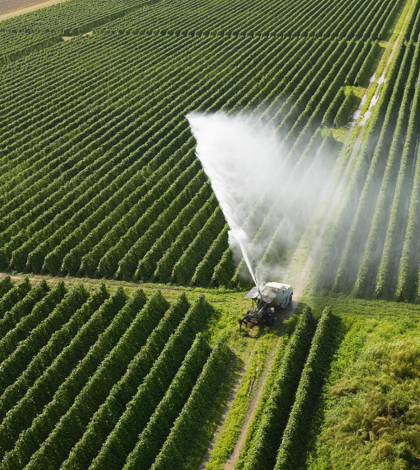With the California drought at its peak, a number of farmers in the Sacramento-San Joaquin River Delta are coming together to help solve the water crisis. Because of the uncertainty behind potential water restrictions and cutbacks, these farmers have agreed to give up 25 percent of their yearly water allocation. Altogether, around 4,000 landowners are entitled to California’s limited supply of water, although that is expected to change as the severity of the California drought continues to grow.
The farmers who have proposed this deal are known as riparian water rights holders. Farmers who hold these permits, despite the California drought, are the longest permit holders with the greatest access to water.
According to the State Water Resources Control Board, “Riparian rights usually come with owning a parcel of land that is adjacent to a source of water… A riparian right entitles the landowner to use a correlative share of the water flowing past his or her property.”
Because these farmers are near an area of water – the Sacramento-San Joaquin River Delta – they are naturally entitled to that source of water. The farmers do not have to go through any permitting process as long as they are not using the water for reservoir type purposes.
According to a report by the Associated Press, “The farmers…are offering to take less river water for irrigation, or leave a quarter of their crops unplanted, in exchange for protecting the remaining 75 percent of their water rights.”
Although it is unknown how many farmers will participate in this agreement, the decision is expected to be a widespread phenomenon across the state. The California drought has many farmers and growers reevaluating their business models. They are beginning to look at what crops they will grow and how large of a batch they will plant. Farmers would rather plant a smaller batch of healthy crops that they know they can provide adequate water for verses having a larger batch of struggling crops.
Some anticipate unrest among farmers who are classified as “junior water right holders” – those who have had water rights for less than a century. These “junior water right holders” would be forced to meet mandatory cuts before “senior water right holders” – those who have had water rights for more than a century.
Jennifer Spaletta, attorney of several Delta farmers, said this cutback is the best agreement all the way around.
“From a business standpoint, it makes a lot of sense to do our part and to help in emergency,” Spaletta told the Associated Press. “At this point, obviously we’re in an absolute drought emergency.”
Even though the deal was brought about my local farmers, the ultimate decision lies with Thomas Howard, the State Water Resources Control Board’s executive director.
 California Water News Daily Your Source For Water News in California
California Water News Daily Your Source For Water News in California


